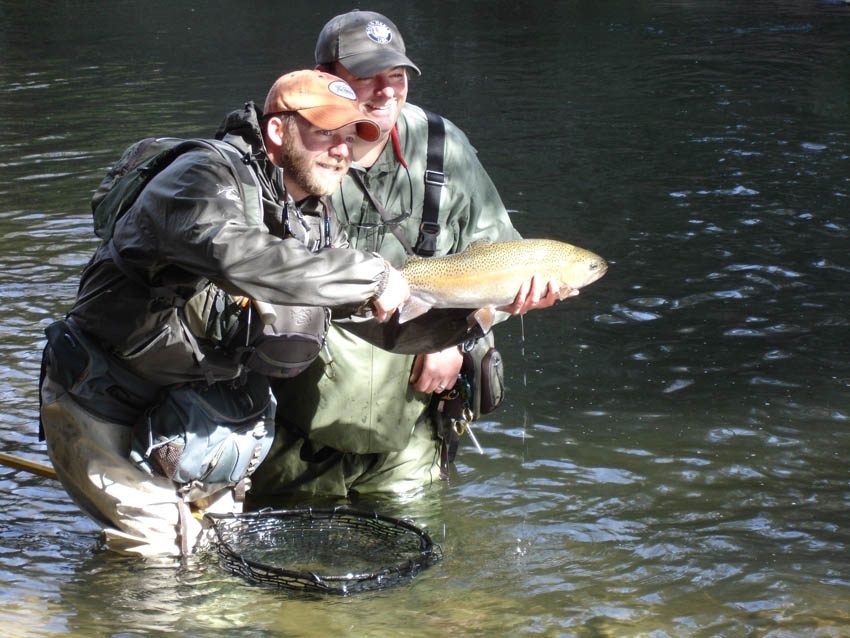By Kent Klewien
The other day I had the opportunity to guide a client who previously had put down his fly rod for many years.
As he put on his waders and boots, and I began rigging the rods, he told me that many of his good friends were avid fly fisherman. Problem was, they had made it clear to him that they preferred he didn’t tag along with them, because they didn’t want to waste their precious fly fishing time teaching a beginner. I felt bad for the guy. He had been painted an outcast by his own buddies, and every year that went by, it made it harder and harder for him to pick up his fly rod. With a comforting grin on my face, I replied, “Man, I really wish you would have called me sooner. We could have nipped that in the butt a long time ago.”
During our hike in to the river, I decided my mission for the day was going to be getting my client back up to speed. I was going to teach him everything he needed to know, so that the next time his buddies went fly fishing, he could surprise them with his presence, and put on a clinic. I had a silent laugh going on inside me throughout the day, as I pictured the looks on his buddies faces as they watched their outcast friend out fish them. I used this to fuel my guiding efforts, and it kept me focused during the slow learning process.
Teaching someone to fly fish from square one can sometimes be extremely challenging. Some pick it up quickly, while others seam to move forward at a snails pace. When the going is tough, it’s easy for guides to take the easy way out, and only focus on teaching what is needed to get the rod bent. Prime example of this, would be to just have the client roll cast his nymph rig all day because it would get the job done. For some clients, that’s all they want. They couldn’t care less about learning the intricacies of the sport, they just want to catch fish. That, however, doesn’t make it ok for guides to take the easy way out. The true professionals, teach as much as they can. They uphold the guide honor code of always giving it their all on the water. It’s a guide’s way of paying it forward to the client, and to the next guide down the road. That way the next guide can step in where the last guide left off, and continue to build the skills of the client even further. Guiding as long as I have, and hearing all the first hand testimonies from clients, I’m sad to admit that there’s many guides out there that don’t pay it forward like they should. Doing this, is no different than my client’s buddies giving him the cold shoulder. Not cool, and a sorry excuse for a friend.
I’m not going to lie, it wasn’t easy getting my client back up to speed. I spent the first hour and a half of the day going over the very basics of fly casting, and we didn’t catch any trout. I then moved on to teaching line management, angler positioning and reading water. Half the day went by before I knew it. It wasn’t all that exciting, but I kept at it because I knew if we took the necessary time to develop good technique, it would provide a solid foundation that would support the growth of my client’s fly fishing skills the rest of his life. Eventually, things started to click, as repetition yielded progress, and muscle memory took over. That progress gave me the opportunity to get my client a few hookups and also begin teaching him the art of fighting fish with a fly rod. After releasing a few nice trout from the net, I was rewarded with the look of confidence in my client’s eyes. He no longer looked at his fly rod like he wasn’t good enough to catch fish. It was priceless. That afternoon, we went on to catch another dozen fish or so, and lost a handful of others. Each one my client performed better than the last. At the end of the day we both knew we had accomplished what we had set out for. I had done my job of getting him up to speed, and my client had regained the love of his passion once again, and I got my client ready to put a smack down on his buddies. It was a good day.
Next time you get the opportunity to set aside your own fly fishing time to help a fellow angler in need, please do so. Paying it forward is often more rewarding than bringing a fish to hand, and at some point in all of our fly fishing careers, we were blessed with a mentor.
Keep it Reel,
Kent Klewein Gink & Gasoline www.ginkandgasoline.com hookups@ginkandgasoline.com Sign Up For Our Weekly Newsletter!

Buddy needs some new friends.
Ditto Tim. Like this guy, I got out of fly fishing for several years. When I got back into it, well, it wasn’t so fun. I remembered a friend of mine who talked a bit about fly fishing and set up a swap, my favorite fishing hole (a treasure filled with big bass, big blue gill, catfish, on a creek and never ever fished by anyone), for some pointers. Within an hour he was pointing out my problems. Good friends are rare, but they are out there.
I was blessed with two friends that I have always described as my mentors. 4 years ago I was totally new to the sport and equally inexperienced about the riversmy area. I was constantly blowing up their phones with questions. where to go. what fly to use and how to fish it etc. after a few months I had proved to them that it was more than a passing phase, I received 3 fly boxes stuffed with patterns, a few sinktips and a my first 8wt setup that had been one of their very first salmon/steelhead rods nmany years ago, thus the little spark of interest became a full blown passion. though they didn’t know it at the time, what they gave me saved my life. I look forward to the day when I will get the chance to do the same for someone down the road
new friends for sure
Absolutely agree. Fly fishing doesn’t need that sort of selfishness.
Very nice insight Kent. I’ve taken this to heart.
You sound like the kind of guide I need.
Kent your the man. Hats off my man. If we ever meet beers are on me buddy….
I’m lucky to have good friends who taught me and still help today. Great article. It takes that kind of passion to be a great guide and clearly you have it.